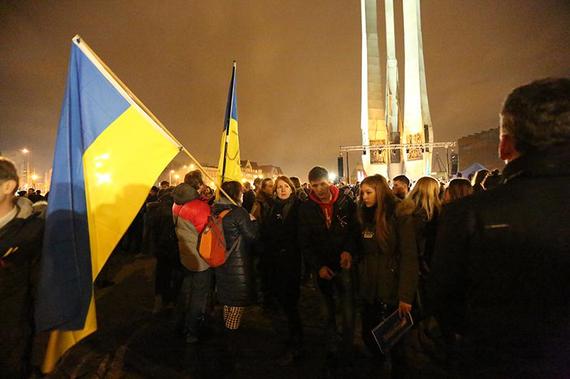Despite all the focus in Europe on refugees, terrorism and Brexit, there is one region which still requires the attention of both European elite as well as its society -- Eastern Europe. We are at risk of losing our focus in the region, and this could hurt countries that are attempting to finally shed their Soviet heritage.
As the most recent issue of New Eastern Europe points out, now is not the time for Europe to lose faith.
Supporting the reform processes taking place in Ukraine is an area where countries like Poland can help lead Europe. One initiative which already exists, and needs new momentum, is the EU's Eastern Partnership program. The Eastern Partnership is an initiative launched in 2009 in Prague. The initiators of this initiative were both Poland and Sweden. Building off the success of EU accession of Central European states, the Eastern Partnership aims at enhancing Europe's relations with six post-Soviet states of Armenia, Azerbaijan, Belarus, Moldova, Georgia and Ukraine. In other words, the goal is to have integrated relations between those states that want to be closer to Europe and ultimately set the stage for future EU accession (when both the EU and these states are ready).
The winter of 2013 and 2014 was a seminal period for the Eastern Partnership and the EU with the Maidan revolution and, following V. Yanukovych's departure, signing the Association Agreement by Ukraine, Moldova and Georgia.
There is no doubt that a large part of the driving forces behind the changes taking place in these countries has been its civil society. We saw how Ukrainians organized against their corrupt regime, demanding reforms and a more European way of life, which includes openness, transparency and democratic norms.
I believe that supporting civil society in the Eastern Partnership countries is an area which not only national governments can support, but local governments in Europe as well. Decentralization and strengthening local government in post-Soviet states is one major area that we can specifically address.
Here in Gdansk we get involved in several very specific projects addressed to diversified communities in Eastern Partnership countries. For years Gdansk has been financially and organizationally supporting the independent secondary school in Minsk, capital of Belarus. Since 2013, this high school enjoys the status of an international school based in Gdansk, which allows its students to take the official High School Exit Examination recognized by the Polish educational system. Many graduates of this high school choose to continue their education at Polish universities.
We foster cultural and economic cooperation with local governments and social organisations from Mariupol, Odessa, Grodno, Polock and Novopolock. The natural space for this cooperation is also supporting the Polish communities in these countries. This approach is consistently carried out by our repatriation activity.
Every year we enable two families to make their home in Gdansk. For several years we have helped in this way dozens of families repatriated to Gdansk. Each of these families receives the apartment, and help in getting a job and education.
Last, but not least, we are active in The Conference of Regional and Local Authorities for the Eastern Partnership (referred to as "CORLEAP"), which is the political forum of discussion, consultation, supervision and monitoring post-soviet countries in respect of all questions relating to the Eastern Partnership at the local and regional level.
Additionally the City of Gdansk provides financial support for the issuance of an important magazine "New Eastern Europe". This is no small expense, but, I believe, well worth its price.
By supporting local governments and local civil society organizations, we can help these countries build a strong foundation for democratic change that would make its way to the top. But it requires a renewed focus on all levels within the European Union. While the current crises may distract the EU policymakers from engaging in the East, it may also be an opportunity for local governments to engage stronger in the Eastern Partnership, supporting local civil societies drive democratic change in their countries, bringing all Europeans closer together.

